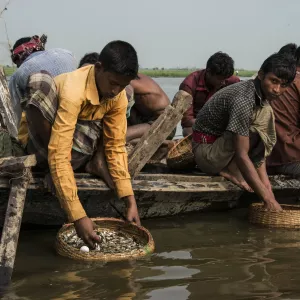Harnessing diversity within aquatic food systems is key to food and nutrition security
Around the world, small-scale fisheries and aquaculture have an outsized impact on human health and the economy. Although smaller than industrial operations when considered separately, they produce the majority of aquatic foods intended for human consumption and land over half of the world’s fish catch. The diversity of people, production and harvesting methods, processing pathways and trade corridors are integral

Harnessing diversity within aquatic food systems is key to food and nutrition security
Around the world, small-scale fisheries and aquaculture have an outsized impact on human health and the economy. Although smaller than industrial operations when considered separately, they produce the majority of aquatic foods intended for human consumption and land over half of the world’s fish catch. The diversity of people, production and harvesting methods, processing pathways and trade corridors are integral to food and nutrition security, but their contributions are often undervalued in research and policy.

